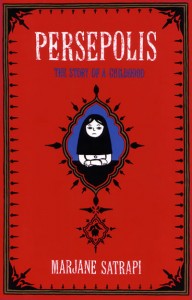On March 16, 2015, Jennie King Mellon Library celebrated Freedom of Information Day, an annual observance of our rights to speak out, to share information freely, and to obtain information that the public has a right to know. See our display of related books and materials in the first floor lobby!
Libraries are information repositories, and are based upon the idea that information should be freely shared and experienced. Libraries and librarians are often on the front lines of First Amendment and information freedom concerns. A recent example is the controversy that occurred when, in 2013, the Chicago Public School System pulled Marjane Satrapi’s award-winning graphic novel Persepolis: The Story of a Childhood from their curriculum.
 The banning of the work could not have happened without discussion amongst various administrators in the school system, much of which occurred in writing, and so the American Library Association’s Office for Intellectual Freedom, the Freedom to Read Foundation (FTRF), and the National Coalition Against Censorship (NCAC) all put in Freedom of Information Act requests for the correspondence in early 2013. FOIA allows for anyone to access, or to request and receive, any information held by the federal government (including public schools) that is not specifically required to be kept confidential. The professional organizations received only a few pages of documents, including a heavily-edited version of the email chain which began with a complaint about the book and ended with the determination that it would be banned.
The banning of the work could not have happened without discussion amongst various administrators in the school system, much of which occurred in writing, and so the American Library Association’s Office for Intellectual Freedom, the Freedom to Read Foundation (FTRF), and the National Coalition Against Censorship (NCAC) all put in Freedom of Information Act requests for the correspondence in early 2013. FOIA allows for anyone to access, or to request and receive, any information held by the federal government (including public schools) that is not specifically required to be kept confidential. The professional organizations received only a few pages of documents, including a heavily-edited version of the email chain which began with a complaint about the book and ended with the determination that it would be banned.
Over a year later, in December 2014, Jarrett Dapier, a student of library science at the University of Illinois who was writing a paper on censorship in K-12 classrooms, submitted his own Freedom of Information Act (FOIA) request on the subject and received the complete email correspondence chain.
The full correspondence received by Dapier reveals that the decision to pull the book from the curriculum was based on two pages in Persepolis identified as being “not appropriate” by one school principal. In a domino-effect panic, the book was thus ordered to be removed from curricula across the entire Chicago Public School System. The correspondence also reveals that some teachers and librarians at the affected schools initiated “pushback,” by noting that the book is acclaimed, and that librarians retain the authority to purchase and make available to students even those texts that have been deemed controversial.
Responding to the controversy, the Chicago Public School System ultimately allowed the work to remain in its libraries, and approved it for study in 11th and 12th grade classrooms. The story indicates how progressive causes can use information transparency to effect change, but also how imperfect the system can be. Information access is a right that needs to be exercised continually to be retained. March 16 is a better time than any to take advantage of this right! See http://www.foia.gov/ for more information.
Sources:
http://americanlibrariesmagazine.org/blogs/the-scoop/persepolis-rising/
http://ncac.org/blog/how-chicago-public-schools-dumped-persepolis/
http://www.ala.org/advocacy/advleg/federallegislation/govinfo/opengov/freedomofinfo


March 23, 2015 at 11:28 am
An unfortunate new ruling will exempt the White House’s Office of Administration from FOIA: https://www.techdirt.com/articles/20150316/14110430329/white-house-celebrates-national-freedom-information-day-making-office-administration-completely-unfoia-able.shtml